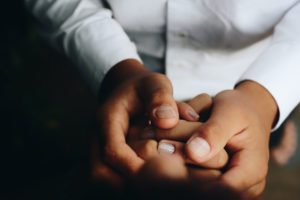Pronouns: she/her

I grew up in a mixed-race family and, as far as I can remember, mental health was never really discussed by anyone in my surrounding community growing up. At least not in the language we use about mental health now. It’s not that I didn’t have a loving family, I was able to talk about my feelings – whether I was happy, sad, angry, or worried – but the idea that these feelings could last long term, that they could take over completely, or that they could crop up without me really understanding why, wasn’t taken as seriously.
“Everyone goes through difficult emotions as a teenager” – this is something I heard a lot, from both family and the community around me. So, when I first spoke out about the scary, breathless, shaky episodes I had been experiencing, I wasn’t surprised when I was told that many people struggle like me as they grow up, but that I would grow out of it. Though the response was not a shock, it was still difficult to take. It had taken a lot of bravery for me to try and talk about what I was going through, and the response made me feel like I was still alone in dealing with them. I knew in my heart that it wasn’t that the people around me didn’t care, but it still hurt trying to move forwards knowing that the people I love most didn’t understand me or what I was going through.
As those scary breathless moments became more and more frequent, I started to do some online research of my own. Here, I began to learn more about this idea of ‘mental health’, and soon figured out that what I had been experiencing were anxiety attacks. Through this research, I began to understand that though it might be true that many people do go through hard times when they are younger, it doesn’t mean that my emotions and experiences are any less important, and it doesn’t mean that some people don’t find dealing with life more challenging than others. Most of all, I learnt that it was okay to ask for help.
 Armed with this new knowledge about mental health, I decided to go it alone and approach my GP. It took a couple of years going back and forth, but I was finally diagnosed with anxiety, and was able to use this at university to qualify for special considerations such as a counsellor, and legal rest-breaks in exams in case I was overwhelmed. Support like this really turned things around for me, and allowed me to enjoy the rest of my teenage years and young adult life without the concern that I would fall behind because of my anxiety attacks. It also gave me the language to slowly let my family and friends know the extent of how I had been feeling over the years, allowing them to gradually understand that strong feelings aren’t always just a temporary teenage period, and that finding positive mental health is actually a life-long journey that we are all on.
Armed with this new knowledge about mental health, I decided to go it alone and approach my GP. It took a couple of years going back and forth, but I was finally diagnosed with anxiety, and was able to use this at university to qualify for special considerations such as a counsellor, and legal rest-breaks in exams in case I was overwhelmed. Support like this really turned things around for me, and allowed me to enjoy the rest of my teenage years and young adult life without the concern that I would fall behind because of my anxiety attacks. It also gave me the language to slowly let my family and friends know the extent of how I had been feeling over the years, allowing them to gradually understand that strong feelings aren’t always just a temporary teenage period, and that finding positive mental health is actually a life-long journey that we are all on.
Now, looking back, it makes me sad that anyone – including my family – would be made to feel like panic attacks are just a part of growing up, or something to be dealt with alone. There is help out there, and we all deserve to get it if we need it. I think part of the reason my community did not direct me to the right places for support is because that kind of help was never an option for them like it is for many of us now. Although I wish I could have understood my anxiety and received support earlier, I know that I am actually in a lucky position to have had support at all, and to have made progress with the people around me, so that we can all talk about mental health more easily going forwards.
I am really proud of who I am now, of my heritage, my family, and how I have been able to learn to manage my anxiety over the years. As a society, we are all still getting to grips with this idea of mental health. But if the community around me can learn and grow, so can you and yours.
If you would like to write a blog featuring your experiences, please read our submission guidelines here, and get in touch via communications@stem4.org.uk.

